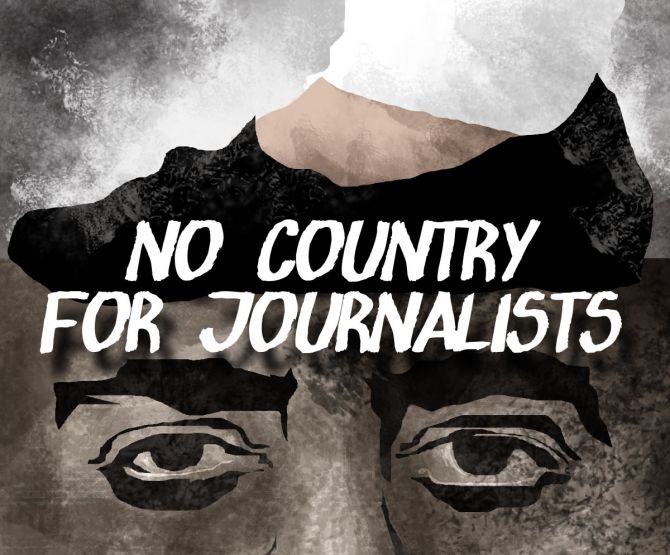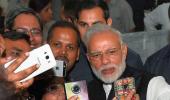'This action sends out a very nasty message in a very strong way -- that nobody is exempt.'
'It is also an attempt to extend the definition of who is an anti-national, who's a terrorist, a definition that's becoming looser under this regime.'
'The sad part is that by the time the courts acquit those arrested, they would've spent years in jail and been taught a lesson.'

On Tuesday, October 3, 2023, the Delhi police arrested NewsClick Founder Prabir Purkayastha and HR head Amit Chakravarty in connection with a probe into the portal's alleged foreign funding.
This came after the Delhi police searched 30 locations connected with NewsClick and its journalists in a case filed under the anti-terror law UAPA following allegations that it allegedly received money for pro-China propaganda.
"The government is testing the waters to see how far it can go to push dissenters -- in this case, the media -- into a corner and compress the anti-Establishment space," Gurbir Singh, a member of the Press Council of India and Chairman, Mumbai Press Club, tells Jyoti Punwani.
What do you make of the NewsClick raids?
This seems more like a fishing inquiry. They registered a case against NewsClick in August and now they are trying to find people who would fit into it. So they are picking up journalists' gadgets, hoping to get some incriminating material.
This reminds me of what happened with The Wire last year. (A case was filed against The Wire in October 2022 by the Delhi police on a private complaint of defamation and forgery by Amit Malviya, who heads the BJP's IT cell.) The Delhi police raided the homes of its editors and picked up their electronic devices but ultimately found nothing.
The allegation is that NewsClick received money from China and indulged in propaganda for China.
As a journalist yourself and as a reader, what Chinese propaganda have you seen coming from NewsClick?
To me it's somewhat like the Bhima Koregaon case. The government is testing the waters to see how far it can go to push dissenters -- in this case, the media -- into a corner and compress the anti-Establishment space.
The curious thing is that apart from the two management persons arrested (Prabir Purkayastha and Amit Chakravarty), most of those who were picked up are contributors. That's ridiculous.
One of those taken for questioning, the senior journalist Urmilesh is a centrist. He used to be editor of Rajya Sabha TV. So we have to ask, what's going on?
This action definitely sends out a very nasty message in a very strong way -- that nobody is exempt, no one can escape if they are critical of the government.
It is also an attempt to extend the definition of who is an anti-national, who's a terrorist, a definition that's becoming looser under this regime.
The sad part is that by the time the courts acquit those arrested, they would've spent years in jail and been taught a lesson.
Will today's raids succeed in scaring journalists?
Yes, definitely.
If you analyse the media scenario today, mainline news channels are completely gone, except for a few voices. The rest are like His Master's Voice.
What's left is print and digital media. These raids are a message to independent online media, that now you're going to get it.
Anyone who wants to survive in, or make a business of news journalism will be put off by these raids.
What can the Press Council of India do about this?
Our mandate is limited to print media. There was talk of amending the 1978 Press Council Act and setting up a Media Council of India.
But if you see the PCI's recent history, this isn't likely to happen. After Justice C K Prasad retired as chairperson in November 2021, the government refused to appoint a chairperson for nine months. They were toying with the idea of an IAS officer to head it, though since its inception, it's always been headed by a retired Supreme Court judge. There was even talk of winding it up. The aim was to torpedo the work of the PCI.
Finally they got around to appointing retd Justice Ranjana Desai as chairperson. But for nine months, we could do no work. Without a chairperson, nobody can call a meeting, no case can be disposed of.
We have managed to do a lot of work since: We have brought out a report on The State of Media in Jammu and Kashmir, in which all forms of media were included; we took up the case of Shashikant Warishe, the journalist who was run over in February in Ratnagiri, a day after he wrote against a local land dealer.

Even though the PCI can do nothing, what do you, as a member and as chairman of the Mumbai Press Club think journalists can do now?
Journalists are already protesting. I was in Delhi all day and there's a journalists' march there on Wednesday. They are assessing if more raids or arrests follow what legal action can be taken.
These raids have shaken up the journalist community quite a bit. Almost every journalist organisation has passed a resolution.
But there is an air of pessimism around. Journalists feel they are fighting a lost battle to survive as an independent institution. What are the platforms left for us? The regular channels have been squeezed. Newspapers that were anti-Establishment have begun taking a centrist line.
Old style journalism is slowly dying. Young people are not joining the profession, and those who can, are leaving in droves, going to PR or TV production. They are abandoning journalism as a viable career. Critical journalism, legacy journalism is dying.
Bu it's not only due to the government. The PCI has started a survey on retrenchment of journalists during Covid and we've found that in the first six months of the pandemic, 2400 journalists lost their jobs. 75% of these were in print. Media companies just sacrificed them and later hired fresh batches at lower wages. So, bad corporate governance is also to blame.
The Mumbai Press Club runs the prestigious Red Ink awards, and every year you get excellent investigative and human rights stories.
Doesn't that contradict your statement that critical journalism is dying?
Most of those great stories are not in mainline media. Most have been published in smaller or digital media. Very few come from the big media houses.
Feature Presentation: Aslam Hunani/Rediff.com











 © 2025
© 2025